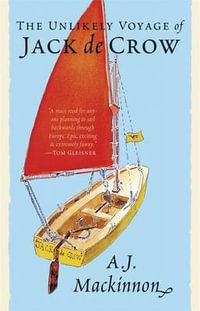Experience is said to be the name men give to their mistakes and of the experience I gained in Spitzbergen that may well be true.
The circumnavigation of Spitzbergen is the first of three voyages described in H. W. 'Bill' Tilman's fifteenth and final book, a remarkable example of his ability to triumph when supported by a crew game for all challenges. The 1974 voyage of the pilot cutter Baroque takes Tilman to his furthest north; the highest latitude of any of his travels in the northern or southern hemisphere. The account of this achievement makes compelling reading, the crew pulling together to avert potential disaster from a navigational misjudgement.
A younger, less experienced crew join Tilman in 1975, this time heading north along Greenland's west coast until a break in the boom necessitates the abandonment of the objective and an early return. "That one can never be quite confident of reaching any of the places I aim at may be part of their charm, and failure is at least an excuse for making another voyage."
The following year proves to be Tilman's last voyage in his own boat, his account beginning with a dry nod to his artillery background: "As I begin to describe this voyage, the discrepancy between the target and the fall of shot provokes a wry smile." Tilman never expected crews to pay, covering all the costs of his voyages personally. He therefore held the quite reasonable view that his crew would pull their weight, show loyalty to the ship and take the rough with the smooth. Sadly, the crew in 1976 fell far short of that expectation, forcing several changes of plan and eventually obliging Tilman to leave Baroque in Iceland. Not for the first time in Tilman's remarkable 140,000 miles of voyaging is he moved to quote Conrad: "Ships are all right, it's the men in them."
Tilman set a high standard and led by example; where his companions rose to the challenge, as they did in the majority of his expeditions, the results were often remarkable. Triumph and Tribulation closes this newly extended edition of his literary legacy; a fine testament to a remarkable life.
About the Author
Harold William 'Bill' Tilman (1898-1977) was among the greatest adventurers of his time, a pioneering mountaineer and sailor who held exploration above all else. Tilman joined the army at seventeen and was twice awarded the Military Cross for bravery during WWI. After the war Tilman left for Africa, establishing himself as a coffee grower. He met Eric Shipton and began their famed mountaineering partnership, traversing Mount Kenya and climbing Kilimanjaro. Turning to the Himalaya, Tilman went on two Mount Everest expeditions, reaching 27,000 feet without oxygen in 1938.
In 1936 he made the first ascent of Nanda Devi-the highest mountain climbed until 1950. He was the first European to climb in the remote Assam Himalaya, he delved into Afghanistan's Wakhan Corridor and he explored extensively in Nepal, all the while developing a mountaineering style characterised by its simplicity and emphasis on exploration. It was perhaps logical then that Tilman would eventually buy the pilot cutter Mischief-not with the intention of retiring from travelling, but to access remote mountains.
For twenty-two years Tilman sailed Mischief and her successors to Patagonia, where he crossed the vast ice cap, and to Baffin Island to make the first ascent of Mount Raleigh. He made trips to Greenland, Spitsbergen and the South Shetlands, before disappearing in the South Atlantic Ocean in 1977.
























